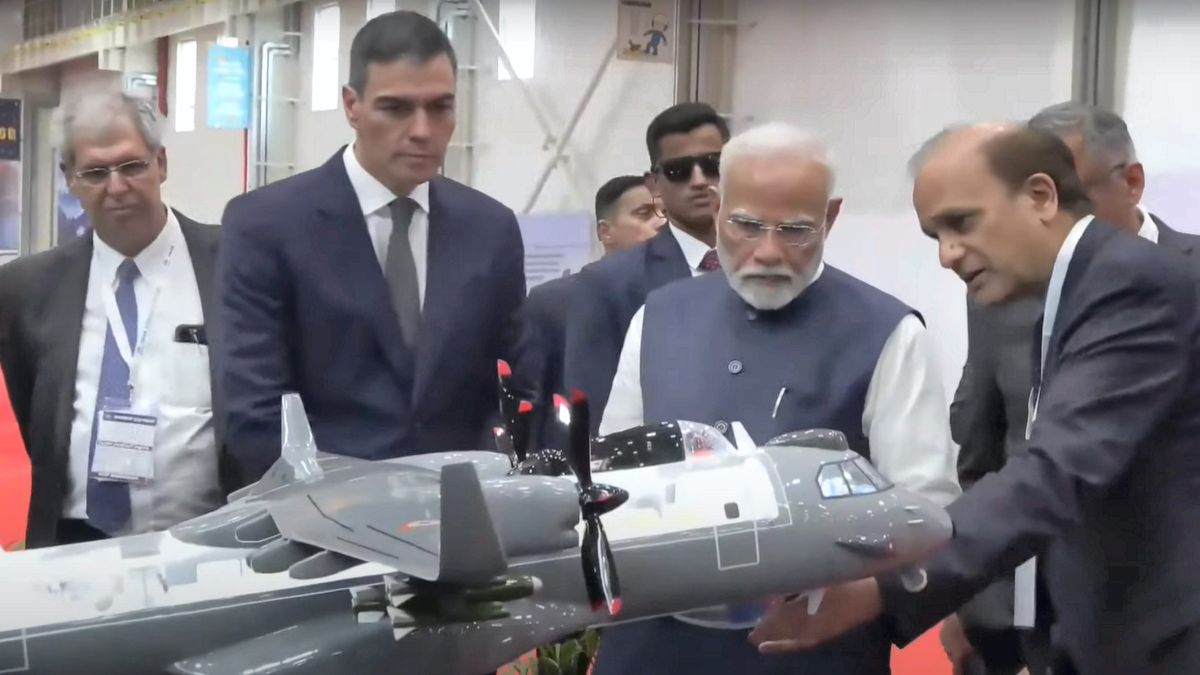Today, October 28 (Monday), marks an important day in India’s defence-producing capabilities. Prime Minister Narendra Modi and his Spanish counterpart Pedro Sanchez have inaugurated the Final Assembly Line (FAL) plant of the C295 medium-lift tactical transport aircraft for the Indian Air Force in Vadodara, Gujarat.
The facility in Vadodara will be India’s first private military transport aircraft production plant, a partnership between Tata Advanced System Limited (TASL) and Airbus Defence and Space (Airbus DS).
Notably, PM Modi laid the foundation stone for the Vadodara final assembly line in October 2022.
Defence Minister Rajnath Singh, present at the event, hailed the project as a “very special day” for India’s aerospace sector, stating, “The C-295 project is a huge accomplishment for the Indian private industry as it is the first project of its kind in which a complete military aircraft will be manufactured in India by a private company.”
PM Modi hails Tata-Airbus plant
At the unveiling of the plant, PM Narendra Modi hailed ties between India and Spain, saying that “from today we are giving a new direction to the partnership between India and Spain.” He added that “the facility will not only strengthen India-Spain relations but will also empower the Make in India, Make for the World mission”.
According to PM Modi, the plant is a reflection of India’s new work culture. “Today it is visible here at what speed India is working, from the idea of any scheme to education. The construction of this factory started only in the month of October two years ago. Today, in the month of October, this factory is now ready for the production of aircraft,” PM Modi said.
PM Modi also mentioned the late Ratan Tata in his speech. “Recently, we lost the country’s great son Ratan Tata ji. If he had been among us today, he would have been happy, but wherever his soul is, he would be happy.”
Incidentally, the Tata-Airbus plant in Vadodara was originally envisioned by Ratan Tata himself. This was highlighted by Tata Sons Chairman N Chandrasekaran who said at the event, “I will fail in my duty if I forget to mention that this project was originally conceived more than a decade ago, in 2012, by the then Tata Sons Chairman, Ratan Tata Ji, who led the whole concept to build a relationship with Airbus and created this partnership with Airbus and laid the foundation stone for this opportunity. So I would like to remember him for his visionary leadership in this very path-breaking initiative. It is a historic moment not only for the Tata Group but also for India…”
Manufacturing the C-295 aircraft
The Vadodara plant will see India manufacture the all-important C-295 aircraft that will replace the Indian Air Force’s ageing Avro-748 planes . In 2021, the Ministry of Defence signed a Rs 21,935-crore agreement with Airbus Defence and Space SA, Spain to supply 56 C-295 transport aircraft to the Indian Air Force.
As per the agreement signed, 16 planes will be delivered fully assembled from Spain, while the remaining 40 are to be assembled in India at the new Tata facility in Vadodara. According to officials, the first aircraft produced locally in Vadodara will be completed by September 2026, with all 40 units scheduled for delivery by August 2031.
The facility in Vadodara will not only assemble the aircraft, said officials, but is also expected to handle the complete production lifecycle, from component manufacturing to assembly, testing, and final delivery. An official from the PM’s office said that it would be a “complete ecosystem from manufacture to assembly, test and qualification, to delivery and maintenance of the complete lifecycle of the aircraft.”
With this plant, India’s atmanirbharta (self-dependence) in the defence sector will be realised, said officials. Notably, India has been focusing on becoming more self-dependent in defence manufacturing — in 2019, the Stockholm International Peace Research Institute (SIPRI) ranked India among the top 25 arms exporters worldwide for the first time, placing the country at the 23rd position. India’s defence exports have also seen a surge from Rs 686 crore in 2013-14 to an impressive Rs 21,083 crore in 2023-24.
Importance of the Vadodara plant
The Tata plant in Vadodara is a big deal for India’s defence manufacturing capabilities. According to an Economic Times report, of the estimated 14,000 parts in each C-295 aircraft, nearly 13,000 are expected to be produced in India. Experts note that this will help build the future of India’s aerospace assembly.
Moreover, the Vadodara plant will create a wave of employment. The Tata-Airbus collaboration is expected to directly create over 3,000 jobs and support another 15,000 indirect jobs. Additionally, the assembly of each aircraft will need over one million hours of labour effort from Tata Advanced Systems Limited and its suppliers. This will not only boost employment but also the local economy. It will also spawn a skilled workforce, which will serve the country’s macroeconomics.
The plant in Vadodara will also spawn an ecosystem of small businesses in the region. Think taxi vendors, chaiwallas, small eateries, mobile kiosks, cleaners and security people.
The plant in Vadodara will also promote the growth of other companies. Officials note that this initiative will promote the growth of ancillary sectors, including those involved in manufacturing components and providing services.
The Tata-Airbus plant at Vadodara will also help reduce India’s dependence on Defence Research and Development Organisation (DRDO) to design, develop, test, and certify any hardware platform.
All in all, the Tata-Airbus C295 project in Vadodara represents a huge shift in India’s defence manufacturing landscape. With the focus on self-reliance, job creation and strengthening of local industries, it will change everything for India’s aerospace sector and national defence.
With inputs from agencies
)